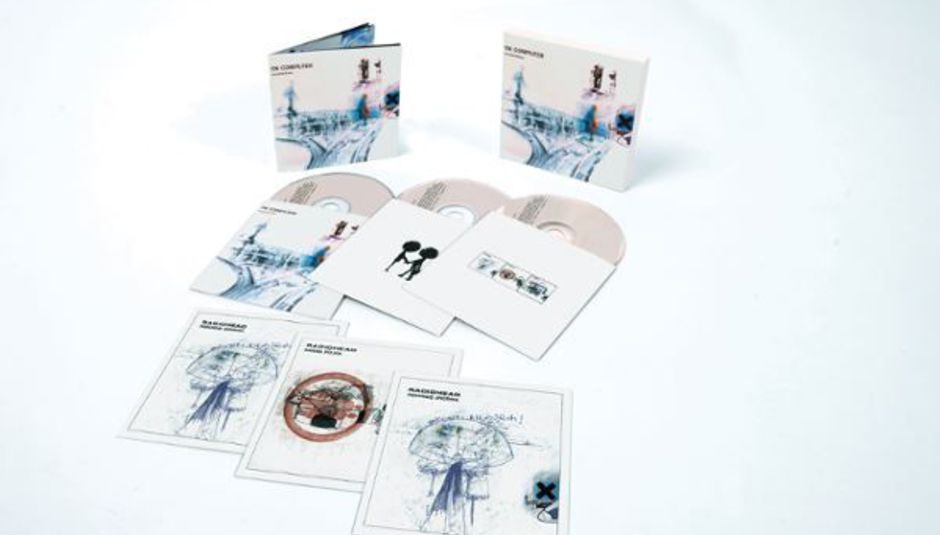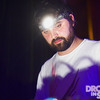There must be a few of you out there wondering why - if EMI are going to milk the Radiohead cash cow with some three-disc album reissues (as is their prerogative, let's be honest) - they didn't do something as helpful as rounding up the B sides in one place, or putting out a collection of rarities. This piece started out as a mixtape that you could happily play as an album, then became a Collector's Guide, and then turned into a brief history of Radiohead at their most conventional... and sometimes most experimental.
‘Stupid Car’ [Drill EP]
The first of Thom’s many anti-car songs, and the only one of the four demos on the Drill EP (released May 5th 1992) not to re-emerge on the debut album. With its lazy strum, and ambient backdrop of distant traffic-noises so muted as to almost be a drone, this could have provided some necessary contrast on Pablo Honey (1993). In retrospect, it’s amusing to see Radiohead pouting and differentiating themselves from contemporary Oxford bands (Ride, Swervedriver) who liked to think they lived in the Detroit (or “Motor City”) of Middle England.
‘Killer Cars’ [‘Anyone Can Play Guitar’ / Itch EP]
Reminiscent of Morrissey around the same period, ‘Killer Cars’ was a phobic’s fantasy of being abducted by the same people who might (literally) kill him just crossing the street – someday those cars are gonna getchoo! You can’t really claim it as a metonym of technophobia generally – Thom really doesn’t like cars – but after initial reservations about the premise (“I’m just going out for a little drive / This could be the last time you see me alive!”), the delicacy of the vocals become more endearing. The sample of a traffic-report in the middle-section sounds somewhat crass, now, but there’s a spikiness to the double-time outro making it almost anthemic.
‘Punchdrunk Lovesong’ [My Iron Lung EP]
Wildly veering between tense figures on a single guitar, and the full band thudding together, this verges on cock-rock. If you opened the Big Book of Radiohead tablature, you’d expect the rhythm guitar part to read “der! / DER-DER! / der-der! / DER-DER! / der-der!” Lines like “A beautiful girl can turn your world to dust” (with suitably apocalyptic backing) make Thom’s anxieties a little clearer than he’d admit on any of the albums, but those guitars are so big and so dumb (somehow echoing a playground chant) it’s not as if the song’s pretending to be clever.
‘You Never Wash Up After Yourself’ [My Iron Lung EP]
Over a simple, forlorn arpeggio, Thom’s bleary morning eyes roam around a squalid (student?) flat, ambiguously depicting it as if he’s woken up in a graveyard, with “spiderwebs over his eyes”. There’s something oddly satisfying about the way the melody reaches its resolution just in time for the anti-punchline that is the song’s title; as if to say, “oh, I’m not actually dead…” or maybe “hah! I shared your squalor, but at least I got away!”
‘The Trickster’ [My Iron Lung EP]
Urgent, garagey, with a snarling lead guitar line that breaks out into bombastic rock to match the B-movie premise, this could be Exhibit A in the case for 'Why Muse might sound like Radiohead, but only the early B sides, so stop with the comparisons, okay?!' With lyrics referencing an anthropological figure representing the exception to dualistic groups or symbols, it’s deliciously pretentious, and no less compelling than, say, ‘Electioneering’: “The air is sacred here / In spite of your claims // Up on the rooftops / Out of reach / Trickster is meaningless / Trickster is weak… // CHORUS: Talking… out… of… this world… / Hey! This is only… halfway x 2”. In light of the later song ‘Bodysnatchers’, Thom seems to like putting a sci-fi spin on his ongoing anxiety that people aren’t who they say they are...
---
‘How Can You Be Sure?’ [‘Fake Plastic Trees’]
One that always makes me smile, ‘How Can You Be Sure?’ is as strong and timeless a piece of songwriting as anything Radiohead have done, showcasing the Elvis Costello influence Thom’s occasionally mentioned but rarely displayed on the albums. It’s the final scene in a break-up, the clear notes of the Hammond organ breaking across the acoustic guitar-part like the first light of dawn, after an all night argument. “I don’t want you / I don’t want you anymore” Thom sings, accompanying his own counter-argument “How can you be sure?”. It’s beautiful, but doesn’t quite fit the remit of The Bends (1995) to favour the Jeff Buckley-like songs you can’t easily sing along to, and strangely aquatic-sounding layers of processed guitars.
‘Maquiladora’ [‘High & Dry’]
Named for a Latin American sweatshop, this early foray into political songwriting might have been on the periphery of Radiohead-fans awareness, but the evils of globalization would soon take centre-stage as a theme. For a change, Thom also seems to be relishing the Hollywood style violence of the car-crashes enacted here.
‘Banana Co.’ [Acoustic versions on Itch EP, ‘Pop Is Dead’; studio version on ‘Street Spirit’]
Another B side that had single written all over it (whereas ‘Pop Is Dead’ had “Embarrassingly naïve potential career-killer” written all over it…) ‘Banana Co.’ was solidly in the early-90s tradition of quiet-loud, post-Nirvana / post-Pixies songwriting. Not that it would have been a generational anthem, but it strikes a chord with teenage despondency: that the world might end (in a flurry of highly topical rioting, perhaps) if You & She don’t get it together. “Oh… / Banana Co. / She says she’s seen you / And she’d like to / She knows if you die / Then we all do… // BRIDGE: And oh… everything’s underground / CHORUS: We gotta dig it up somehow! / Yeah yeah! // (Everything’s burning down…) / We gotta put it out somehow!”
---
‘Talk Show Host’ [‘Street Spirit’ / Romeo & Juliet OST]
The all-time classic B-side (to ‘Street Spirit’, Radiohead’s highest placing single), and still a live favourite played as an encore, this attempt to incorporate some of DJ Shadow’s ideas was used to good effect in Baz Luhrmann’s Romeo & Juliet (also featuring ‘Exit Music’ over the closing credits). More than anything Radiohead had done so far, the song pushed its sounds and structure away obvious mimesis of the lyrics (a slightly pathetic fantasy about “Waiting… with a gun, and a pack of sandwiches” to kill a Z-list celebrity). The four plaintive notes on electric piano are the sound of routine-bound drudgery, every step an effort not to sink down… but are the violent drum-breaks replacements for more obvious squalls of guitar at the narrative’s murderous conclusion? Is the confusion of the structure relevant, or are the lyrics just something that happened amidst the general meaninglessness of everyday life? By the end of the extended coda, the song’s obscure character has already been forgotten.
---
‘Polyethylene 1 & 2’ [‘Paranoid Android’]
Basically, another song stitched together from two distinct parts, much like ‘Paranoid Android’ (or REM’s ‘Leave’, or indeed Franz Ferdinand’s breakthrough single). This doesn’t make it another ‘Bohemian Rhapsody’ for the 1990s, though. After the falsetto and fingerpicking of the intro, a more yobbish-sounding Thom counts in the rock-section. In spite of the obvious comparisons to its stronger sibling, it’s good enough to come straight after the A-side, and here’s an extra-terrestrial weirdness to the melody and choice of effects on the lead-guitar to make this one of the more musically interesting pieces from the OK Computer sessions.
---
‘Pearly*’ [‘Paranoid Android’]
It’s hard to say how successful Thom’s “character-songs” really are, when we mostly see what they see, without much distance or context. Written around the time that criticism like Amused to Death, novels like Generation X, and albums like Zooropa defined the zeitgeist, it does however make sense that the characters in his songs should find their lives reduced to soundbites, getting considerably less than the Warholian 15 minutes of fame. Do all the lyrics, here, refer to a single incident (a child screaming in a Hard Rock Café, ‘Daddy hurt me!’ in her own personal Hell of persecution…) or are they a handful of percepts floating through the singer’s delirious (or jetlagged) mind, with the words “How d’you / Get your / Teeth so / Pearly…?” just as insistent as a child’s screams...? Somehow this effects-heavy rock song with its guitar-solo almost like a clarinet is more memorable than most of the B-Sides, although Thom-alone knows whether it really means anything.
‘A Reminder’ [‘Paranoid Android’]
One of the most personal, clearly-sung recordings from the period, ‘A Reminder’ sounds shagged-out, as Thom details the kind of tantrums he may continue to have as a middle-aged curmudgeon. There’s not much pretending the character is discrete from the songwriter, and the delivery suggests a sincere hope that someone will take it literally, someday: “If I get old / Remind me of this / That night we kissed / And I really meant it // If I get old / Call me on the phone / Dial me up / Play me this song...” Thematically, it’s paired with the sleepier, less intelligible ‘Melatonin’ – a lullaby of hazy synths backing what might be one parent’s lovesong to their child, or both, the voices blending into an androgynous murmur.
‘Meeting in the Aisle’ [‘Karma Police’]
Described at the time as pointing the direction for Radiohead’s post-OK Computer material (really only a few tracks, like ‘Morning Bell’ and ‘Everything in its Right Place’) this drifting instrumental inhabited the same sleepy, sterile space as REM’s ‘Airportman’ or much of their own Up album (Hey! Radiohead had begun influencing their influences!) There’s a hint of Boards Of Canada, or the loungey electronica of (Radiohead remixers) Zero 7, too.
‘Lull’ [‘No Surprises’]
Rather like ‘You Never Wash Up After Yourself’, ‘Lull’ plays out a bright melody, of Velvet Underground simplicity, as quickly as possible, and then moves on. It’s one of several vague allusions to well-managed, strongly medicated depression… with a hint of frustration that real feelings are being locked up, as the singer shrinks to nothing: “Crawling through the keyhole… I’m in a lull”.
‘Palo Alto’ [‘No Surprises’]
The title refers to a town in Silicon Valley (Wow! there’s a term I haven’t heard in a while…), also the setting for Douglas Coupland’s Microserfs (1995). I tend to think of this as one of Thom’s Patrick Bateman songs, though: over the most abrupt and aggressive chorus since ‘Creep’ or ‘Just’, Yorke sneers out a sarcastic parody of business-speak: “Pleased to meet you / Thanks for asking / Thanks for asking / I hope you have a good day, too...” before the guitar topples into elevator muzak, and the singer starts apologising for sinking into a coma of apathy or medication.
---
‘How I Made My Millions’ [‘No Surprises’]
One thing journalists know about Thom’s partner is that questions about her are off-limits; one of the few things that Radiohead fans know is that the clicking-sound in the background of ‘How I Made My Millions’ is Rachel chopping vegetables in the kitchen as Thom commits one of the most beautiful songs he’s ever written to minidisc (of all things). Thom, it seems, is playing the piano in his living room, and singing cryptic words so distended as to be emotive vocalizations first, and lyrics second. This perhaps makes the B side to an international hit (‘Karma Police’) one of the most widely heard home-demos ever, and another sign of how far recording technology had come, at the end of the century. Around the same time, Michael Stipe gave a troubled and fame-fearing Thom the mantra “I’m not here / This isn’t happening” to help him cope with stress, but Thom’s final “Let it… fa-all / Let it… fall” is an even more comforting antidote to anxiety. The answer to the title is presumably: by singing like an English Jeff Buckley, for the less confident and conventionally handsome. In retrospect, the irony of the title also hints at the morbid self-consciousness that would make the Kid A / Amnesiac sessions so nightmarish; how can you continue to get through to people without milking your cash cow?
---
RARITIES
Okay. Those were the best of the early B sides for your mix CD. If you actually are rocking it old school, though, track these down, and stick them on a C90:
‘Nobody Does It Better’ [on Jools Holland]
One of Thom’s favourite songs, the theme to The Spy Who Loved Me has also been appropriated by Cat Power, presumably with the same rationale: that it’s an expression of total love and admiration, raised to the level of hero-worship… or even superhero worship (a kind of feminine counterpart to ‘I Wanna Be Your Dog’, making you think 'If that’s how sexy the singer sounds, what’s the He/She of the song actually like?!'). If you see the video, Thom looks absolutely beatific crooning the chorus, even in his spiky haired, angry young John Lydon incarnation. Jonny’s guitar solo, meanwhile, screams post-punk. Radiohead don’t tend to release covers, but this could have happily appeared on The Bends (1995).
---
‘Big Boots’ AKA ‘Man O’War’ [fragment, from Meeting People Is Easy]
“I’m your su-u-u-uperhero” sang Thom on ‘Lucky’, but the Carly Simon cover and this unfinished, unreleased song (the recording of which is documented in Grant Gee’s film) tells you exactly which hero he really wants to be: Bond. James Bond. Around the time that Bond was being rebranded for the late 90s, Yorke, Thom Yorke explored the darker side of 007’s psyche: a lover’s revenge for being neglected as he travels “From ocean to ocean” in pursuit of “Hijacked affairs”. It’s creepy stuff, in the vein of ‘Talk Show Host’, with surreal imagery reminiscent of ‘Climbing up the Walls’ (“I’ll bake you a cake / All full of eyes / What a na-a-a-aasty surprise”).
‘Big Ideas (Don’t Get Any)’ AKA ‘Nude’ [fragment, from MPIE]
Goddamnit – what took them so long?! You know ‘Nude’ by heart, now, even if you’re a 16 year-old Skins fan who would have been barely speaking when ‘Creep’ came out. After ten years of testing different models, Radiohead replaced the pretty electric piano of the verse with almost subliminal synths, replaced Ed’s dramatic (but still not dated) guitar solo with Thom humming and absent-mindedly vocalizing. For obsessive Radiohead fans, it may still be hard to un-hear the big rock version (with its Hammond organ climax) when you’re listening to the dry clicking and murmuring of the 2007 album version, but it’s a great song no matter what.






















